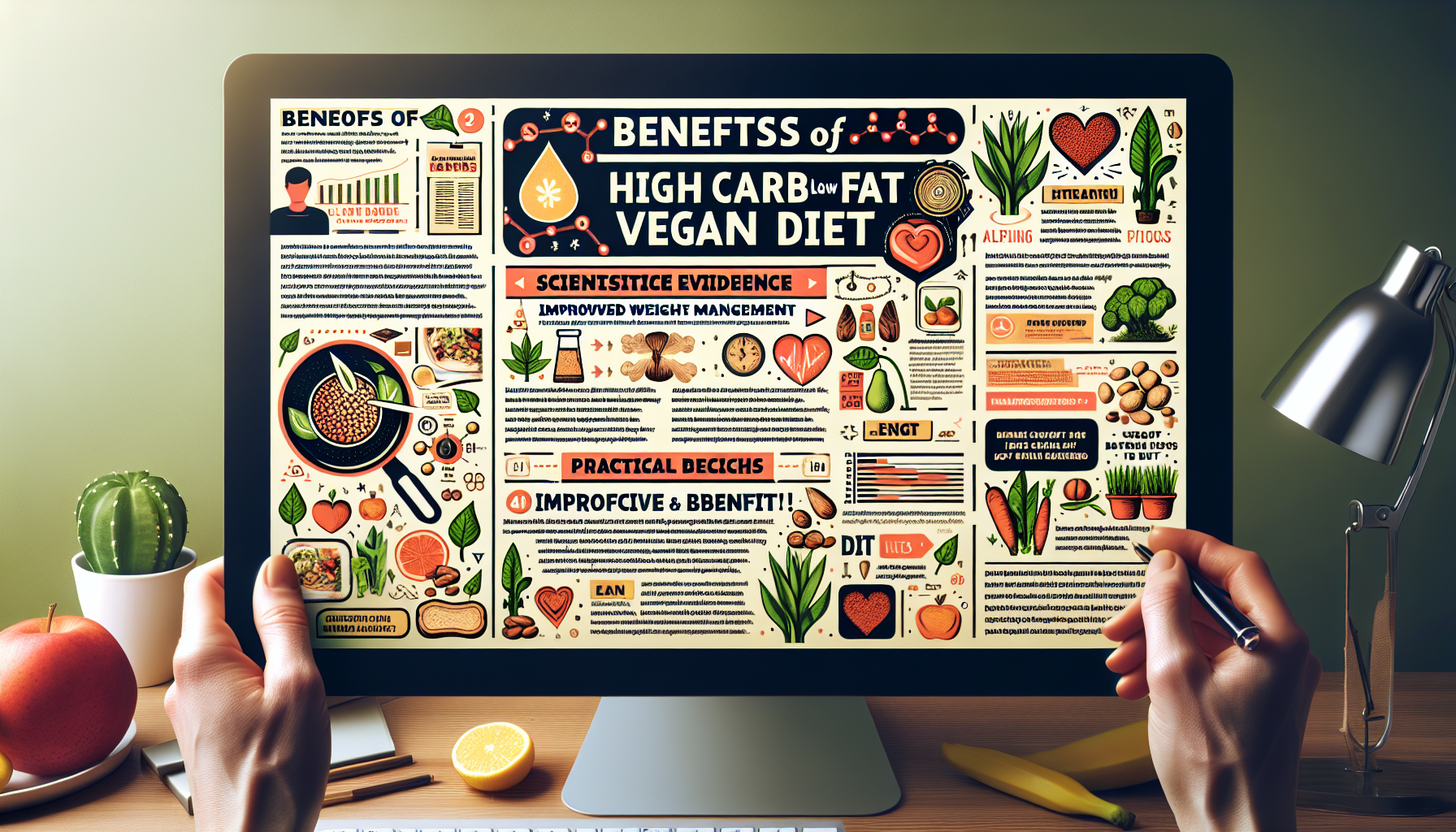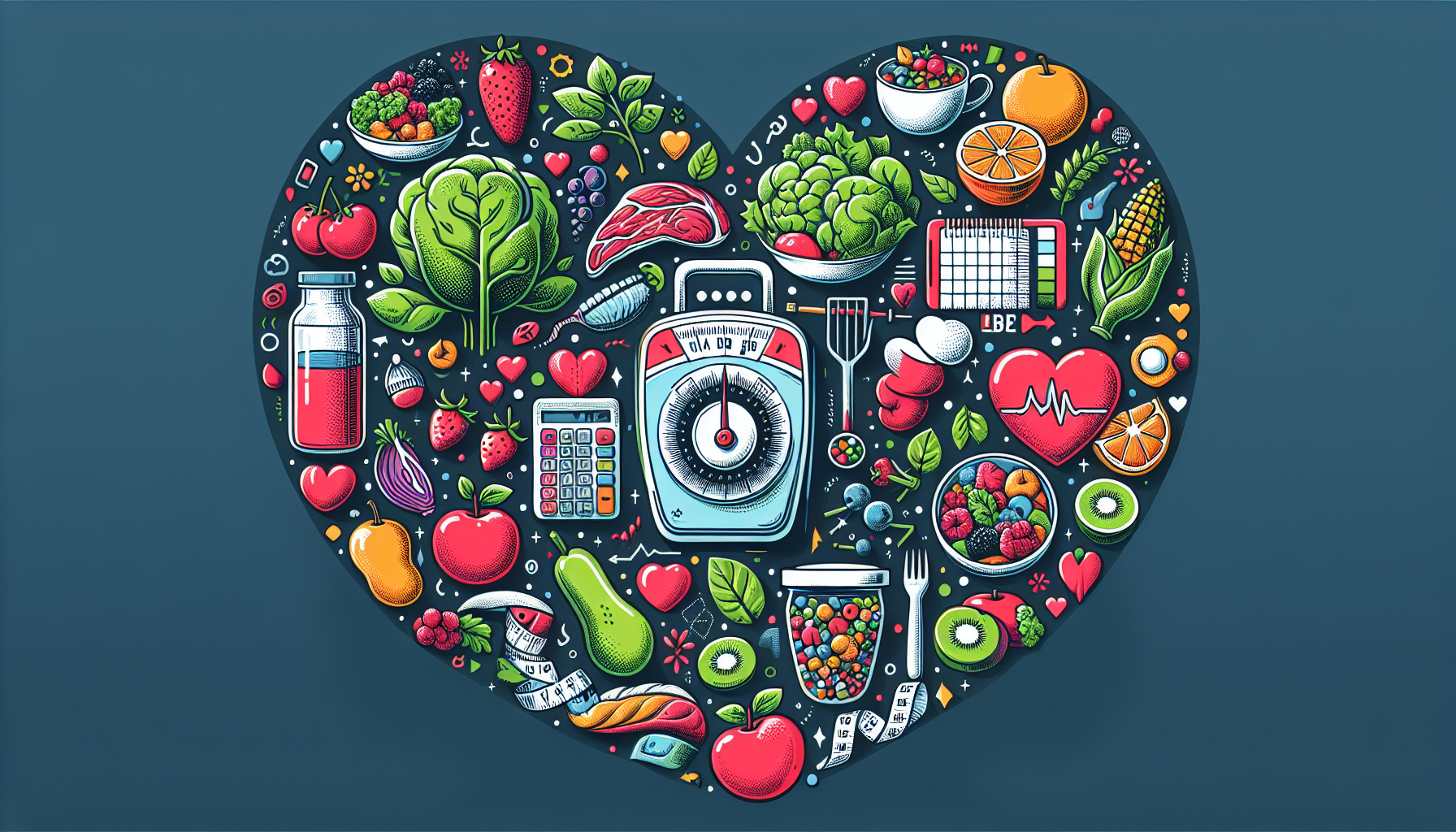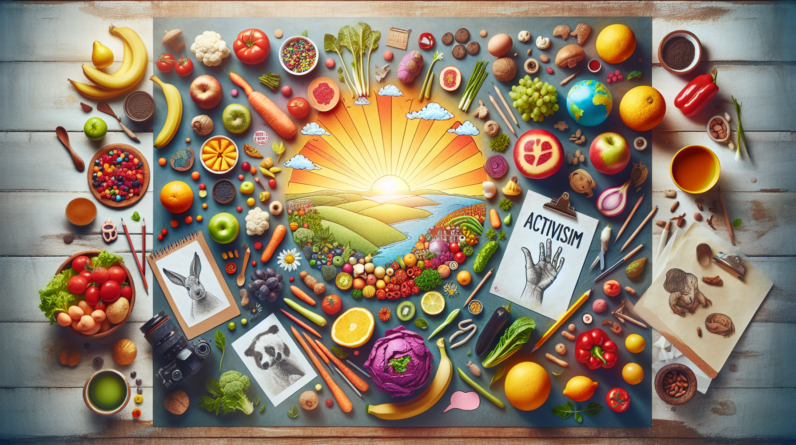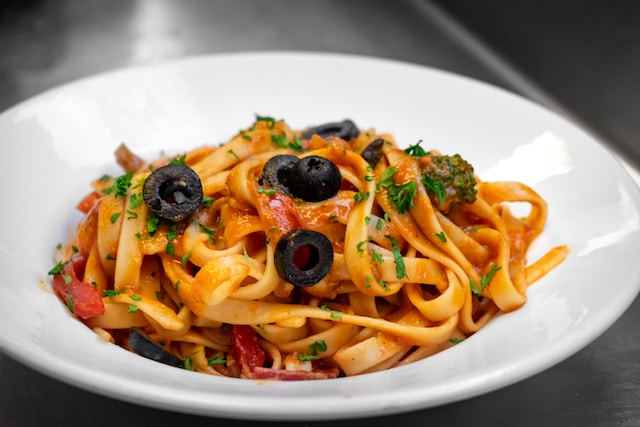Are you looking for a healthy and sustainable way of eating? Look no further than the High Carb Low Fat Vegan Lifestyle. This approach to nutrition focuses on consuming a diet rich in carbohydrates, while keeping the fat content low and eliminating all animal products. By embracing this lifestyle, you can enjoy a wide range of delicious plant-based foods that will nourish your body while promoting weight loss and overall wellness. Get ready to discover a new and exciting way of eating that is not only good for you, but also for the planet. Say hello to the High Carb Low Fat Vegan Lifestyle!

Table of Contents
Benefits of a High Carb Low Fat Vegan Lifestyle
Improved Digestion
A high carb low fat vegan lifestyle can significantly improve digestion. Since this diet is rich in fiber from fruits, vegetables, whole grains, and legumes, it promotes regular bowel movements and prevents constipation. Fiber also helps to maintain a healthy gut microbiome, supporting the growth of beneficial bacteria and reducing the risk of digestive disorders such as irritable bowel syndrome. Additionally, the high water content in fruits and vegetables aids in softening stools and preventing dehydration, which is essential for optimal digestion.
Weight Loss
One of the key benefits of a high carb low fat vegan lifestyle is its effectiveness in weight loss. This way of eating is naturally low in calories, as most plant-based foods are lower in calories than animal-based products. Additionally, a high carb intake can help to keep you feeling full, reducing the likelihood of overeating. The low fat aspect of this diet also contributes to weight loss, as fats are more calorie-dense compared to carbohydrates. By adopting a high carb low fat vegan lifestyle, you can achieve sustainable weight loss without feeling deprived or restricted.
Increased Energy Levels
Following a high carb low fat vegan lifestyle can provide a significant boost in energy levels. Carbohydrates are the body’s main source of fuel, and by consuming a diet high in them, you ensure a steady and sufficient energy supply. Unlike the energy spikes and crashes often associated with high fat diets, a high carb low fat vegan lifestyle allows for a more stable energy release throughout the day. Additionally, the natural sugars found in fruits provide a quick source of energy, while complex carbohydrates like whole grains provide sustained energy to keep you going throughout the day.
Reduced Risk of Chronic Diseases
A high carb low fat vegan lifestyle has been linked to a reduced risk of chronic diseases. Studies have shown that following a plant-based diet can lower the risk of heart disease, type 2 diabetes, and certain types of cancer. The abundance of fruits and vegetables in this diet provides a wide range of vitamins, minerals, and antioxidants that support overall health and protect against cellular damage. Moreover, the low-fat aspect of this diet helps to maintain healthy cholesterol levels and reduce the risk of cardiovascular disease.
Lower Cholesterol Levels
A high carb low fat vegan lifestyle can help to lower cholesterol levels, particularly the levels of LDL (bad) cholesterol. By minimizing the intake of saturated and trans fats found in animal products, this diet promotes a healthier lipid profile. Plant-based foods are naturally low in saturated fats and contain no cholesterol, while also providing beneficial plant sterols that help to block cholesterol absorption in the intestines. Including high-fiber foods like whole grains and legumes further aids in lowering cholesterol levels. By adopting this lifestyle, you can take control of your cholesterol and promote heart health.
What is a High Carb Low Fat Vegan Diet?
Explanation of Macronutrients
A high carb low fat vegan diet focuses on consuming a higher proportion of carbohydrates and lower amounts of fats from plant-based sources. Macronutrients, or macros, are the three main nutrients that provide energy to the body: carbohydrates, fats, and proteins. In this diet, the emphasis is on obtaining a majority of calories from carbohydrates, which are broken down into glucose and used as an immediate energy source. Fats are limited to a smaller portion of daily caloric intake, while proteins are obtained from plant-based sources.
Recommended Food Groups
A high carb low fat vegan diet encourages the consumption of whole plant-based foods. These include fruits, vegetables, whole grains, legumes, nuts, and seeds. These food groups provide a diverse range of nutrients such as vitamins, minerals, antioxidants, and phytochemicals. Including a variety of colorful fruits and vegetables ensures a wide array of nutrients, while whole grains and legumes provide complex carbohydrates and plant-based proteins. Nuts and seeds offer healthy fats and additional protein. Overall, a high carb low fat vegan diet emphasizes the importance of nutrient-dense whole foods.
Potential Nutrient Deficiencies
While a well-planned high carb low fat vegan diet can meet all nutritional needs, there are certain nutrients that require attention. Vitamin B12, for example, is primarily found in animal-based foods, so supplementation or fortified foods are recommended to ensure sufficient intake. Omega-3 fatty acids, which are essential for brain health, can be obtained from plant-based sources such as flaxseeds, chia seeds, and walnuts. Iron and calcium, commonly associated with animal products, can be obtained from plant sources like legumes, leafy greens, and fortified plant-based milks. It is important to educate yourself and ensure a balanced intake of key nutrients on this diet.
Meal Planning and Recipes
Meal planning is a crucial aspect of a high carb low fat vegan lifestyle to ensure a balanced diet. Incorporating a variety of whole grains, legumes, fruits, and vegetables into one’s meals is important for meeting nutritional needs and preventing monotony. There are numerous recipes and meal plans available that cater specifically to this lifestyle. Planning meals in advance and batch cooking can help save time and ensure a continuous supply of nutritious meals throughout the week. Experimenting with different spices, herbs, and cooking methods can add variety and flavor to meals, making the transition to this lifestyle enjoyable and sustainable.
Carbohydrates in a High Carb Low Fat Vegan Diet
Types of Carbohydrates
Carbohydrates can be divided into two main types: simple and complex. Simple carbohydrates, often referred to as sugars, are found in foods like fruits, honey, and processed sweets. Complex carbohydrates, on the other hand, are made up of long chains of sugar molecules and are found in whole grains, legumes, and starchy vegetables. In a high carb low fat vegan diet, it is preferable to focus on complex carbohydrates as they provide a steady release of energy and are accompanied by fiber, vitamins, and minerals.
Sources of Complex Carbohydrates
A high carb low fat vegan diet encourages the consumption of numerous complex carbohydrate sources. Whole grains such as quinoa, brown rice, oats, and whole wheat products are excellent sources of complex carbohydrates. Legumes like lentils, chickpeas, and black beans also provide a good amount of carbohydrates along with protein and fiber. Starchy vegetables like sweet potatoes, potatoes, and corn are other examples of complex carbohydrates. By incorporating these foods into your meals, you can enjoy sustained energy levels and a wealth of nutrients.
Importance of Fiber Intake
A high carb low fat vegan diet is inherently rich in dietary fiber, which is found in abundance in plant-based foods. Fiber plays a crucial role in digestion, promoting regular bowel movements and preventing constipation. It also helps to maintain a healthy gut microbiome by feeding beneficial bacteria in the colon. Additionally, dietary fiber can aid in weight management by keeping you feeling full and satisfied. By including ample amounts of fruits, vegetables, whole grains, and legumes in your diet, you can easily meet your daily fiber needs and enjoy the associated health benefits.
Fats in a High Carb Low Fat Vegan Diet
Healthy vs. Unhealthy Fats
It is important to distinguish between healthy and unhealthy fats when following a high carb low fat vegan lifestyle. Healthy fats, such as those found in avocados, nuts, seeds, and olives, are an important part of this diet. These fats provide essential fatty acids, vitamins, and minerals. On the other hand, unhealthy fats, such as saturated fats and trans fats, should be minimized or avoided altogether. Saturated fats are often found in animal-based products and processed foods, while trans fats are commonly found in fried and baked goods. By making conscious choices and focusing on healthy fats, you can maintain a balanced and nutritious diet.
Plant-Based Fat Sources
A high carb low fat vegan diet relies on plant-based fat sources to meet dietary fat requirements. Avocados are an excellent source of healthy fats and can be enjoyed in salads, sandwiches, or as a smoothie ingredient. Nuts and seeds such as almonds, walnuts, chia seeds, and flaxseeds provide healthy fats, protein, and micronutrients. Olive oil, coconut oil, and nut butter can be used in moderation as sources of healthy fats. By incorporating these plant-based fats into your meals and snacks, you can enjoy their benefits while keeping your fat intake at an appropriate level.

Proteins in a High Carb Low Fat Vegan Diet
Plant-Based Protein Sources
Contrary to popular belief, it is entirely possible to meet protein requirements on a high carb low fat vegan diet. While plant-based proteins may be considered incomplete, combining different protein sources can provide a complete amino acid profile. Legumes such as lentils, beans, and chickpeas are excellent sources of protein and can be used in a variety of dishes. Whole grains like quinoa, brown rice, and oats also contribute to protein intake. Nuts, seeds, and their respective butters can be enjoyed as sources of both protein and healthy fats. Incorporating a wide variety of protein-rich plant foods into your meals will ensure you obtain all essential amino acids.
Combining Proteins for Complete Amino Acid Profile
To ensure a complete amino acid profile, it is important to combine different protein sources in a high carb low fat vegan diet. Legumes, such as lentils, beans, and peas, are low in certain essential amino acids but contain higher levels of others. Pairing legumes with whole grains such as rice, quinoa, or whole wheat bread helps to complement the amino acid profiles and create a complete protein source. For example, a meal of lentils and brown rice or a chickpea-quinoa salad would provide a balanced array of essential amino acids. By familiarizing yourself with protein combinations, you can easily meet your protein needs while enjoying a varied and delicious diet.
Tips for a Successful High Carb Low Fat Vegan Lifestyle
Gradual Transition
Transitioning to a high carb low fat vegan lifestyle can be done gradually to ensure long-term success. Start by incorporating more plant-based meals into your diet and gradually reducing the consumption of animal-based products. Experiment with new recipes, flavors, and ingredients to make the transition enjoyable. Seek support from online communities or forums to connect with like-minded individuals who can share their experiences and provide helpful tips. By taking a gradual approach, you can adapt to the lifestyle at your own pace and increase your chances of maintaining it in the long run.
Meal Preparation and Planning
Meal preparation and planning are crucial for success on a high carb low fat vegan lifestyle. Set aside time each week to plan your meals and create a shopping list. Batch cook grains, legumes, and vegetables to have ready-made ingredients for quick and nutritious meals throughout the week. Preparing meals in advance and portioning them out can save time and ensure that you always have a healthy meal option available. Experiment with new recipes to keep your meals interesting and varied. By being prepared and organized, you can make the transition to this lifestyle seamless and convenient.
Staying Hydrated
Staying hydrated is essential for overall health and is particularly important on a high carb low fat vegan lifestyle. Many plant-based foods, especially fruits and vegetables, have high water content and contribute to your daily hydration needs. In addition to consuming hydrating foods, it is important to drink plenty of water throughout the day. Aim for at least eight glasses of water daily, and increase your intake if you are physically active or in hot weather. Staying hydrated helps to support digestion, maintain energy levels, and promote overall well-being.
Balancing Macronutrient Ratios
In a high carb low fat vegan lifestyle, it is important to maintain a balanced macronutrient ratio to ensure adequate nutrient intake. Carbohydrates should make up the majority of your caloric intake, with a focus on complex carbohydrates from whole grains, legumes, fruits, and vegetables. Fats should be consumed in moderation, prioritizing healthy plant-based sources such as avocados, nuts, and seeds. Protein requirements can be met by consuming a variety of plant-based protein sources and combining complementary proteins. By being mindful of your macronutrient ratios and choosing whole food sources, you can ensure a well-rounded and nourishing diet.
Exercise and Physical Activity
Engaging in regular exercise and physical activity is important for maintaining a healthy lifestyle, regardless of dietary choices. Incorporating both cardiovascular exercises and strength training into your routine can help to improve cardiovascular health, build muscle and bone density, and enhance overall fitness. Choose activities that you enjoy, whether it’s cycling, running, swimming, or practicing yoga. Exercise not only supports physical health but also has a positive impact on mental well-being. By incorporating regular physical activity into your high carb low fat vegan lifestyle, you can maximize the benefits and achieve optimal health.
Addressing Common Concerns about a High Carb Low Fat Vegan Lifestyle
Meeting Nutritional Needs
A common concern about a high carb low fat vegan lifestyle is whether it can meet all nutritional needs. With proper planning and awareness, it is entirely possible to meet all nutritional needs on this diet. By consuming a wide variety of whole plant-based foods and incorporating fortified sources of key nutrients, you can obtain all the necessary vitamins, minerals, and macronutrients. Supplementation for nutrients like vitamin B12 may be necessary, but overall, a well-planned high carb low fat vegan diet can be nutritionally adequate and support optimal health.
Sustainability and Environmental Impact
Adopting a high carb low fat vegan lifestyle can have a positive impact on sustainability and the environment. Animal agriculture is a major contributor to greenhouse gas emissions, deforestation, and water pollution. By reducing or eliminating animal products from your diet, you can significantly reduce your carbon footprint and contribute to a more sustainable future. Additionally, plant-based diets require fewer resources, such as land and water, to produce compared to animal-based diets. Choosing plant-based options also supports the welfare of animals by reducing demand for animal products. Transitioning to a high carb low fat vegan lifestyle not only benefits your health but also the planet.
Social Challenges and Dining Out
One concern when adopting a high carb low fat vegan lifestyle is how to navigate social situations and dining out. It’s important to communicate your dietary preferences and needs to friends, family, and restaurants in advance. Many restaurants now offer vegan options or are willing to accommodate dietary restrictions. When dining out, look for dishes that are centered around plant-based ingredients such as grains, legumes, and vegetables. If there are limited options, you can always ask for modifications or customize your meal. It can also be helpful to bring a vegan dish to share at social gatherings to ensure there is a suitable option available. With a bit of planning and communication, you can enjoy social experiences while adhering to your high carb low fat vegan lifestyle.
Additional Resources and Support
Books and Cookbooks
There are numerous books and cookbooks available that can provide guidance and inspiration for a high carb low fat vegan lifestyle. Some popular titles include “The Starch Solution” by Dr. John McDougall, “How Not to Die” by Dr. Michael Greger, and “Forks Over Knives” by Gene Stone. These books offer valuable information on the health benefits of a plant-based diet and provide recipes to help you get started.
Online Communities and Forums
Connecting with like-minded individuals and seeking support from online communities can be extremely beneficial when adopting a high carb low fat vegan lifestyle. Online platforms such as Reddit, Facebook groups, and vegan forums offer a space to ask questions, share experiences, and find valuable resources. These communities can provide guidance, recipe ideas, and support to help you navigate the lifestyle successfully.
Consulting Registered Dietitian
If you have concerns or specific dietary needs, consulting a registered dietitian who specializes in plant-based nutrition can provide personalized guidance and support. They can help you create a meal plan that suits your unique nutritional requirements, address any concerns or deficiencies, and ensure that you are meeting all your nutritional needs on a high carb low fat vegan lifestyle. A registered dietitian can also offer additional resources and support tailored to your specific situation.
In conclusion, adopting a high carb low fat vegan lifestyle can offer numerous benefits for improved digestion, weight loss, increased energy levels, reduced risk of chronic diseases, and lower cholesterol levels. Understanding the basics of a high carb low fat vegan diet, incorporating a range of carbohydrates, healthy fats, and plant-based proteins, and following practical tips for success can help you thrive on this lifestyle. By addressing common concerns, exploring additional resources, and seeking support from online communities or a registered dietitian, you can confidently embrace a high carb low fat vegan lifestyle and reap its many rewards.





